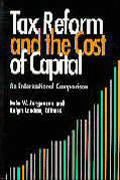The tax reform movement that swept the U.S., Great Britain, and most other industrialized nations during the last decade has focused attention on international comparisons of the cost of capital. More recently, international comparability has become a critical issue of tax harmonization. This is a vital concern in the European Community, as well as between Canada and the United States.
This volume provides international comparisons of the cost of different types of capital for nine major industrialized countries—Australia, Canada, France, Germany, Italy, Japan, Sweden, the United Kingdom, and the United States—for the period 1980-1990. In the early 1980s the introduction of tax incentives for saving and investment gradually shifted the tax base from income toward consumption. By 1990 most of these special tax provisions had been reduced or repealed in order to lower tax rates and equalize the tax treatment of different forms of capital income. Income was firmly reestablished as the most appropriate basis for taxation.
Separate chapters for each of the nine countries, written by leading experts in public economics, provide detailed accounts of tax policy changes over the decade. Each chapter contains a quantitative description of these tax policies and summarizes this information in the form of effective tax rates. The book thus serves as an indispensable reference for comparing capital income taxation in industrialized countries during a period of rapid policy change.

